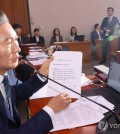- California Assembly OKs highest minimum wage in nation
- S. Korea unveils first graphic cigarette warnings
- US joins with South Korea, Japan in bid to deter North Korea
- LPGA golfer Chun In-gee finally back in action
- S. Korea won’t be top seed in final World Cup qualification round
- US men’s soccer misses 2nd straight Olympics
- US back on track in qualifying with 4-0 win over Guatemala
- High-intensity workout injuries spawn cottage industry
- CDC expands range of Zika mosquitoes into parts of Northeast
- Who knew? ‘The Walking Dead’ is helping families connect
Yen’s climb bodes well for S. Korean exporters
SEOUL (Yonhap) — South Korean exporters, led by automakers and steelmakers, are widely projected to expand their presence in overseas markets as the Japanese yen continues to climb against major currencies, industry sources said Thursday.
The won-yen arbitrated exchange rate hit the lowest in almost two years hovering around 1,066.7 won per 100 yen as of 3:00 p.m., down 42.07 won from the previous session’s close.
Thursday’s reading marks a sharp fall from the 900-won level seen in June of last year, and the first time in 23 months that the rate has exceeded the 1,066-won level.
The U.S. dollar serves as the benchmark currency for the exchange rate between the two, which tend to move together in their rates to the greenback.
The Korean won closed at 1,202.5 to the greenback, down 5.1 won from Friday’s closing price, while the yen-dollar rate rose to 112 per the U.S. dollar, from the 117-yen level over the cited period.
The yen’s recent rise is a boon for South Korean automakers, electronics firms, and steelmakers in particular, as the two countries directly compete in overseas markets over products ranging from autos to home appliance goods.
According to data compiled by the Korea International Trade Association, South Korea’s exports fall 0.49 percent if the won-yen rate drops 1 percent.
The yen has climbed against major currencies including the U.S. dollar as a slowdown in China and emerging markets prodded investors to seek safe assets, although Japan’s central bank said in late January it will brace for negative interest rates.
A firmer yen means that Japanese exporters face a setback in competing against foreign rivals in overseas markets, which in turn reduces their profitability.
Some observers say, however, the yen’s climb would not directly affect Japanese exporters in the short haul.
In 2014, the won-yen arbitrated exchange rate dropped 11.3 percent following a 20.5 percent drop the previous year, as the yen continued to remain weak against the greenback on the back of Japanese Prime Minister Shinzo Abe’s campaign, dubbed Abenomics, to end years of deflation and listless growth through massive fiscal and monetary policy easing measures.
“The key issue is whether the yen will remain firm down the road,” said an official at Hyundai Motor Co., the country’s largest automaker.
Also, Japanese tech firms have been losing their foothold in overseas markets for the past few years, which means that their South Korean rivals would not benefit much from the yen’s strength, according to the observers.















